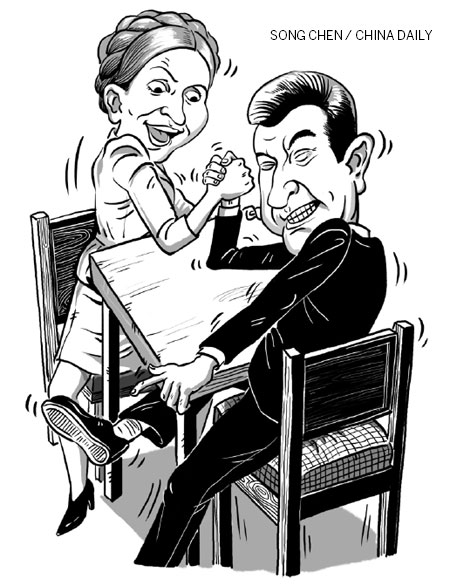Fast-changing political scene is Ukraine
By Zhu Honggen (China Daily) Updated: 2014-02-25 08:17
Ukraine's political scene has been in turmoil since last week, when riot police tried to clear Independence Square in Kiev of anti-government protesters. This resulted in multiple deaths. Although President Viktor Yanukovych agreed a compromise deal with the opposition leaders following the bloody clashes, the situation changed dramatically when dozens of MPs quit the ruling Party of Regions.
With a new speaker appointed, the Verkhovna Rada, Ukraine's parliament, quickly voted to strip Yanukovych of his presidential powers and restore the 2004 Constitution; and it ordered the release of Yulia Tymoshenko, the ousted prime minister, who was sentenced to seven years' imprisonment for abuse of power over a gas contract with Russia. Yanukovych appears to have left the capital and his whereabout is unknown.
The direct cause of the anti-government protests, whose scale matches those of the 2004 Orange Revolution, was Yanukovych's unexpected about-face on signing an association agreement with the European Union, which was viewed as a steppingstone toward Ukraine's integration into the EU. Protests sprang up in Kiev and other cities in the west and north of Ukraine demanding the ousting of Yanukovych. The protests evolved into a political crisis when the ruling party rushed through a package of laws on Jan 16, aimed at suppressing the protests on legal grounds.
However, this triggered another mass rally and violent clashes between protesters and riot police in Kiev on Jan 19. The political situation then deteriorated sharply with the largest number of casualties since Ukraine's independence in 1991.
Located between Russia and the EU, Ukraine is a country with crucial geopolitical importance. Russia has been seeking to integrate Ukraine into the Customs Union, which is composed of Russia, Belarus and Kazakhstan, but this conflicts with the EU's Eastern Partnership Project, which includes the planned integration of Ukraine. Theoretically, Ukraine can only choose one or the other, owing to the fact that the members of the Customs Union and the EU implement different common tariff policies toward non-members. However, there are also geopolitical and strategic interests in Ukraine for both Russia and the West.
Russia remains Ukraine's largest trade partner, largest export market, and main source of energy. In terms of energy, a number of European countries are dependent on natural gas imports from Russian suppliers, with the bulk of the supply distributed through pipelines across Ukraine. Russia has been extending its influence over Ukraine in economic and political terms and particularly by economic means in recent years.
In August 2013, before the Third Eastern Partnership Summit in Vilnius, Russia disrupted Ukrainian imports as a warning of what would happen if it signed the agreement with the EU. As compensation to Ukraine's about-face on the deal, Russia offered financial aid of $15 billion, together with a substantial gas discount. Russia's measure effectively stopped Ukraine from signing the Association Agreement and a free trade deal with the EU.
However, the majority of Ukrainians are in favor of the deal with EU, particularly the younger generation. Since independence, the EU, together with other Western countries, has been the major source of foreign investment of Ukraine and it is Ukraine's second most important trade partner. The foreign investment from the EU and other Western countries is conducive to the capital formulation and the long-term growth of Ukraine's economy. The Yanukovych administration frequently reiterated that the EU agreement was a priority while frequently declining Russia's invitation to join the Customs Union.
Yanukovych failed to resolve the protests in a peaceful way because of his misjudgment and his overestimating his power to control them. The deaths of protesters provoked even larger protests until the situation spiraled out of control. He should have held direct talks with the international communities, the opposition leaders, and the protesters, and he should have actively prepared for the Ukraine-EU summit, which had been scheduled for the beginning of 2014, because that would give him a chance for multilateral negotiation. Although he has declared that the parliament's resolutions are illegal and he will not sign them, the situation is obviously out his control and it will not be easy for him to restore his power. Ukraine's parliament has decided to schedule a new presidential election for May 25, so the political order is changing in Ukraine.
Ukraine's prospects are still not clear, as who will win the power struggle has still not been decided. The 2004 Constitution was amended in 2010, transferring much power from the parliament to the president. If the 2004 constitution is reinstated, the political regime will go back to the parliamentary system. If a presidential election is held in May, the opposition leaders will be competing for the presidency. Ukraine's integration into the EU can be reactivated if state power is smoothly taken over by the opposition.
However, Yanukovych is insisting that he is the legitimate president and refuses to resign, and he may still have some support in the east of Ukraine. Russia's possible reaction toward political change in Ukraine should also not be dismissed. Russia is not likely to give up its influence over Ukraine, as Sevastopol is home to Russia's Black Sea Fleet and there are many Russians and Russian-speaking people in the eastern and southern parts of Ukraine.
The author is associate professor at the Institute of Russian, East European and Central Asian Studies, Chinese Academy of Social Sciences.

(China Daily 02/25/2014 page9)




